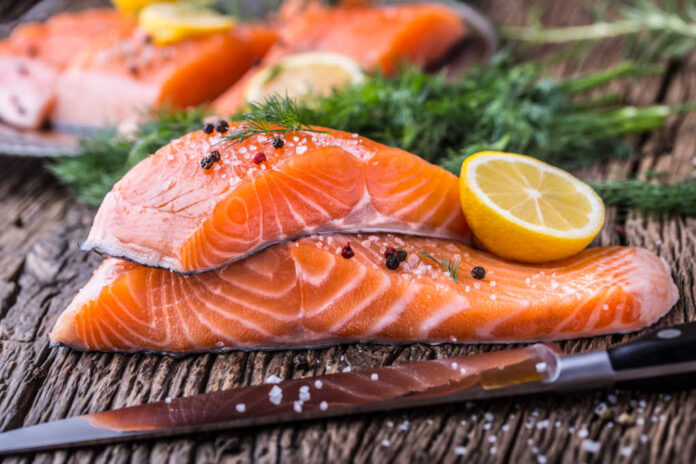
Salmon is tasty, nutritious, widely available, and easy to cook.
Perhaps more impressively, eating this fatty fish can help protect against various chronic diseases.
Salmon For Heart Health
Heart disease is the leading cause of death worldwide.
Among the many ways you can reduce your risk of cardiovascular disease, eating salmon is one of the most uncomplicated and delicious.
Salmon is rich in omega-3 fatty acids, which have been shown to decrease risk factors for heart disease, such as high triglyceride levels and abnormal heart rhythms.
The proteins and vitamins, especially vitamin D, in salmon can help regulate blood pressure, reduce inflammation, and inhibit vascular calcification, all of which are important for a healthy heart.
Salmon For Brain Health
Omega-3 fatty acids and vitamin D from salmon are also associated with reductions in anxiety and depression and appear to generally improve mental health.
Eating fish regularly (at least once a week) has been linked to a reduced risk of Alzheimer’s disease and cognitive decline. This is likely related to the high amounts of nutrients such as magnesium, selenium, vitamin D, and several B vitamins, which are associated with cognitive function.
Salmon For Weight Management
If you’re trying to lose weight or maintain a healthy weight, salmon can be a helpful addition to your diet.
It’s also a great source of protein, which helps you feel full and satisfied after meals. This also helps regulate the hormones that control your appetite, meaning you’ll be less likely to overeat and snack on less healthy foods later.
Salmon For Immune Function
The fatty acids and nutrients found in salmon can help keep your immune system functioning correctly.
This can then decrease the severity and frequency of infections, such as the common cold and flu.
Additionally, the anti-inflammatory effects of omega-3 fatty acids may help reduce the severity of autoimmune diseases.
How To Include Salmon In Your Diet
Salmon is a versatile and easy-to-cook food, making it a great addition to any diet.
It can be grilled, baked, broiled, roasted, steamed, sautéed, smoked, or even eaten raw as sushi or sashimi.
You can flavor it up with various sauces, spices, and marinades, or keep it simple with just a bit of salt and pepper. Some people enjoy it on its own without any additions – it has a much less “fishy” taste than many other types of fish.
Whatever way you choose to eat it, salmon is a tasty and nutritious food that can help improve your overall health and reduce your risk of chronic disease.






















